Don’t Look Back: Bob Dylan vs. Donovan
D.A. Pennebaker’s documentary, Don’t Look Back, captures Bob Dylan during his 1965 tour of England. Bringing It All Back Home had peaked at number 1 in the UK. Teenage girls stalk his hotel, fans chase his limousine, and newspapers feed the frenzy with endless Bob Dylan articles.
Pop singer Donovan was also enjoying a surge of popularity in 1965. Throughout the film, Dylan is preoccupied with the local press. Seemingly every time he opened the paper, Donovan’s name appeared.
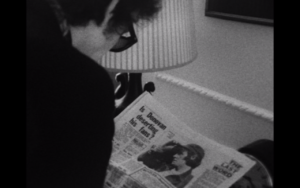
Our first hint of jealousy arrives early on. Dylan reads a newspaper and is fixated on an article. Clearly agitated, Dylan exclaims, “Donovan! Who is this Donovan?”
Dylan puts the question to ex-Animals keyboardist, Alan Price. In a thick accent, Price describes Donovan as “a Scottish bloke.” The mood shifts from humor to vindictiveness as Price praises the Scottish singer. He informs Dylan that Donovan “has been around” and is “a very good guitar player,” adding, “he’s better than you.”
Handling it with a sense of humor, Bob replies, “Right away I hate him!” There is an audience to hear the jest. The camera pans to Joan Baez as she flashes an awkward smile.
Unyielding, Price continues to defend Donovan. “He’s alright. I like him. He’s not a fake.” The implications of this final comment go unexplored. Dylan merely points to the newspaper clipping and announces, “Well, I got him up on the wall.”
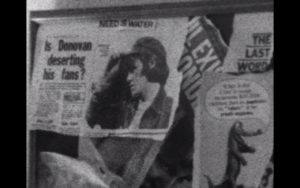
As the camera pulls away, we see a picture frame transformed into a collage. Beneath Donovan’s article, bold letters advise, “Don’t be fooled by a pretty face. We’re not.”
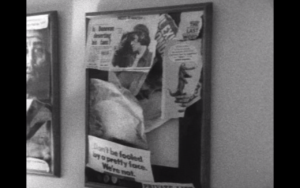
Price reads the headline aloud. “Is Donovan deserting his fans?” Price now turns on the very man he had been defending. Declaring, “He’s only been around for three months,” Dylan promptly responds, “That’s what I call a LOSER!” All have a laugh at the expense of Donovan.
The next scene finds Bob Dylan at a formal gathering. An elderly gentleman tells Dylan’s manager, “I’ve got an award for him for the most promising artist of the year and the best selling folk record, Freewheelin’.” It’s a strange record to celebrate. Three albums later, The Freewheelin’ Bob Dylan feels far removed from the current tour.
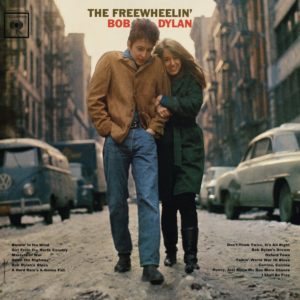
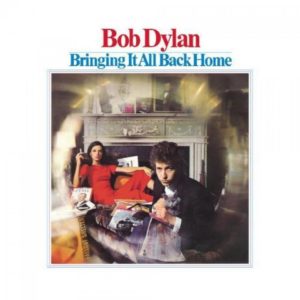
Dylan is unimpressed with the accolades. Half of Bringing It All Back Home had been electric, as would be the forthcoming Highway 61 Revisited. Sick of being pigeonholed as a “folk” singer, Dylan tells Grossman, “I just don’t want it. Tell them to give it to Donovan!”
Inside the ballroom, there is live music and industry-types dressed in tuxedos. Again, Dylan is obsessed with a newspaper that has published yet another Donovan feature. Over the booming music, he yells “Donovan!” Getting the attention of his friend, he shouts the name again and mumbles something about targets before declaring, “He’s our target for tomorrow!”
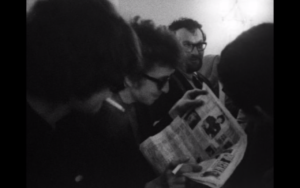
Dialogue isn’t always necessary to underscore the nagging presence of Donovan. One scene merely shows Dylan riding in the backseat. Again, his head is in a newspaper. Completely absorbed, he offers no conversation to the other passenger. The headline reads “DYLAN DIGS DONOVAN!” Dylan offers no verbal response to the article. Simply imagining his thoughts offers more drama than any conversation.
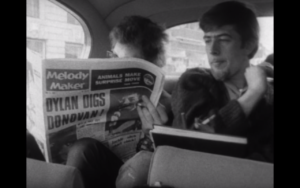
Bob Dylan and Donovan eventually meet, but not under ideal circumstances. A hotel party has spiraled out of control. Some drunken buffoon has thrown a glass out of the window. Management assumes that the incident occurred at the wild party unfolding in Bob Dylan’s room.
Donovan is also in town and attends the party. Certain that none of HIS friends were the culprits, Dylan berates a member of Donovan’s entourage as shocked revelers look on. Despite denying involvement, the tirade of verbal abuse continues. Not wanting any of this man’s “shit,” Dylan explains, “I’m not taking no fucking responsibility for cats I don’t know man. I got enough responsibility with MY friends and my own people.” The interrogation continues as the situation escalates.
After all Bob’s ranting and raving, the situation has gotten very real. Physical violence is a distinct possibility. Dylan gives the man a small push that further angers his adversary. After some tense moments, Bob demands, “Be groovy or LEAVE!”
They both decide to be groovy and the party continues. Dylan even offers a handshake and explains he simply didn’t want anyone to get hurt.
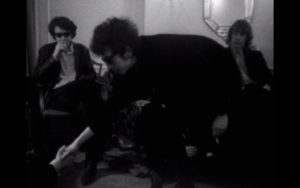
Donovan relieves lingering tensions with a performance of “To Sing For You.” The small audience is captivated. Mid-song, Dylan shouts, “Hey, that’s a good song, man!” Cynics may question his sincerity or the curious decision to praise Donovan mid-performance.
Dylan follows with an inspired rendition of “It’s All Over Now Baby Blue.” Is it a scene of genuine camaraderie or is a competition unfolding between two rivals?
Even with the hotel drama over, Donovan still pervades the film. One memorable scene begins with a sign announcing two sold out nights at the Royal Albert Hall.
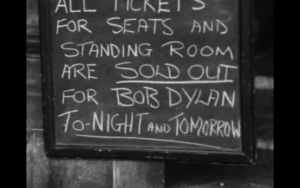
The camera cuts to Dylan riding with a concert promoter. He tells Bob, “I’ve been in my office all day organizing my OTHER tour.” The promotor laughs before bringing up that “OTHER folk singer.” Donovan!
Dylan asks, “How’s that tour doing?”
The reply? “Not so good.”
The promoter relates a conversation about the Donovan concert. He had been asked whether a venue should be booked exclusively for the singer. His response was “ I can’t really see that.” Does he think one other act should be booked? He suggests FOUR additional performers!
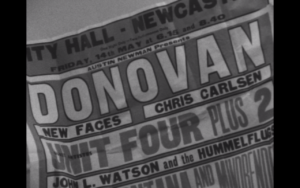
It’s clear who the real star is as Dylan performs at Royal Albert Hall. In a sequence of clips, Dylan tears through older songs like “The Times They Are A Changing,” along with new material. While much of his lyrical content is rather serious, songs like “Talking World War III Blues” add a dose of humor. In a light-hearted moment, Dylan gets a final dig on that “other” folk singer. Loud and clear, Dylan sings, “I looked in the closet/There was DONOVAN!” The phrase is met with roaring laughter and applause from the audience!
Don’t Look Back ends in triumph for Bob Dylan. Ultimately, the film is about fame and adapting to the pressure of life in the public eye. Often there is competition and jealousy. Whatever tensions appear between Dylan and Donovan, both singers led successful careers. Only one, however, would become a legend!

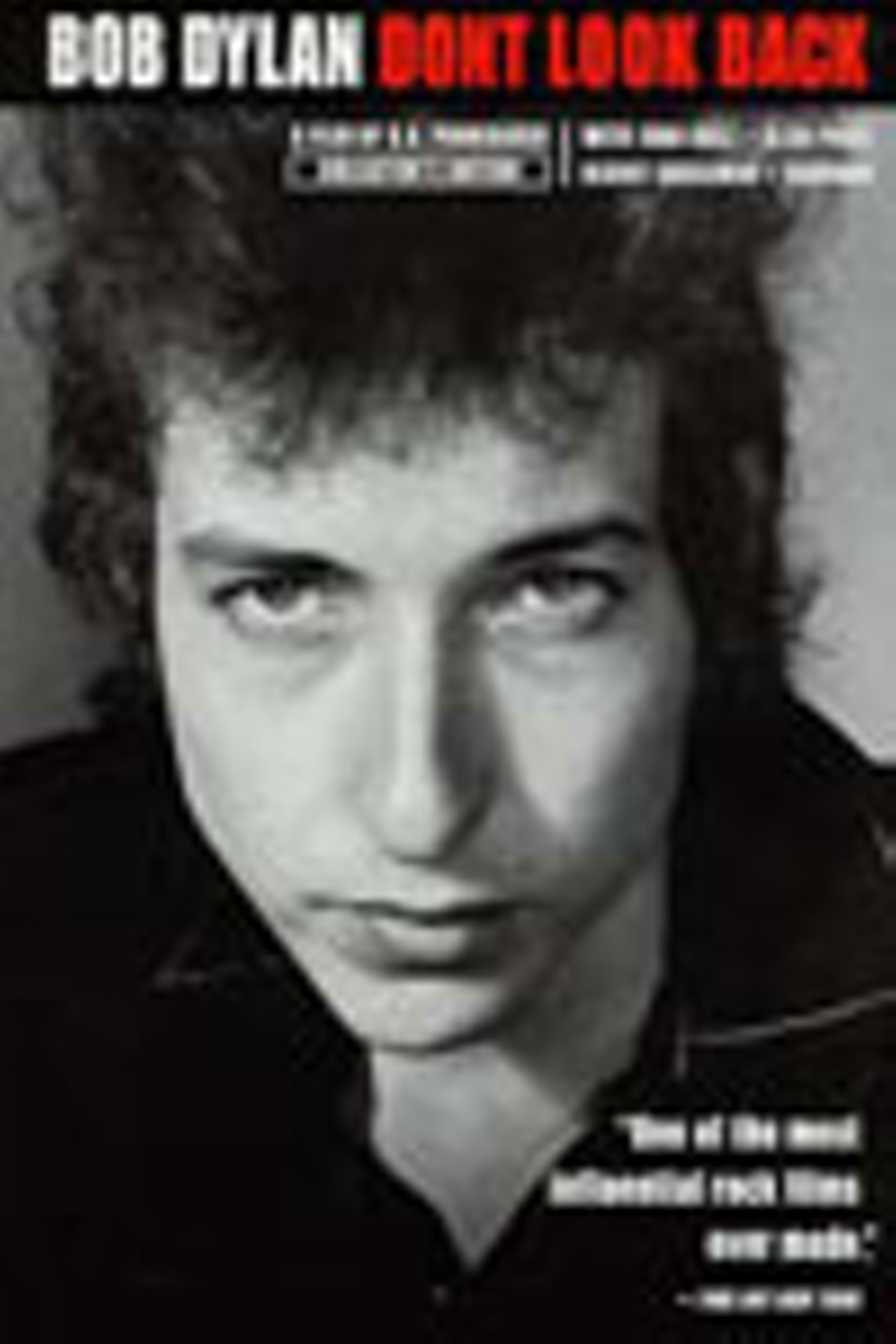


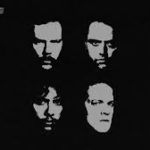
I had the great pleasure of seeing Donovan live last year here in Houston. My daughter in law (*best* daughter in law ever!) took me and I can not thank her enough! It wasn’t just seeing and hearing him in person (even though I’ve had a crush on him since I was able to cross the street by myself) it was hearing the stories and the background of all these songs that we have been listening to all these years without really understanding their origins. And the one story of Paul McCartney showing up at his door one day and then a cop showing up (don’t worry, all went well ; ) was worth the price of admission by it’s self.
Anyway, while I have tremendous respect and admiration for Dylan, Donovan will always have a special place in my heart.
Dylan *is* the better musician, but Donovan just has something that I can’t define. It’s more than just personality, it’s the gift of taking us out of a harsh reality and into a prettier, sweeter, fairy tale land just for a little while. And that is worthy, too.
I think singing “It’s all over now, Baby Blue” was a very telling choice. Not only that, but Dylan nitpicks the lyrics, leaving only the following.
“You must leave now, take what you need, you think will last
But whatever you wish to keep, you better grab it fast
Yonder stands your orphan with his gun
Crying like a fire in the sun
Look out the saints are comin’ through
And it’s all over now, baby blue”
“The highway is for gamblers, better use your sense
Take what you have gathered from coincidence
The vagabond who’s rapping at your door
Is standing in the clothes that you once wore
Strike another match, go start anew
And it’s all over now, baby blue”
The words could be a direct allusion to Donovan trying to “take Dylan’s place” in folk music, particularly because he tended to imitate his style, both musically and visually,
It’s true, only one became a legend. Dylan may be a household name, and may have rode a higher horse all those years ago. However, Dylan is also known to be an unpleasant man, self-absorbed and mean. He peaked long ago and leaves a trail of embarrassingly bad albums in his wake since then.
Shortly after Donovan released his album Beat Cafe in 2004, he played a gig at Hove Town Hall in the UK. Hove Town Hall is brutalist architecture, like a soviet mausoleum. Visually cold and aurally draining. There’s no raked seating, just cheap foldable chairs laid out in rows on the flat floor surround by raw concrete.
Donovan sat on such a chair at the front and before the gig began things didn’t look good. It was not a stadium, not a condusive environment, not a moment a superstar would relish at all. Donovan played and sang with such heart though that two songs in, everybody was on their feet and dancing with each other. Donovan’s smile was ear to ear. He turned that crappy Hall into the best gig of my life so far, and I won’t be alone in feeling that way.
Dylan… he’d have turned his nose up, whined and complained, and then sang his crappiest songs off-key before skulking away in a rage of bruised ego.
There is only one legend. You are correct. Not the biggest star, no, but the biggest human, easily.
Mark, I could not agree more!!! You hit the nail on the head!
Brad.
I’m 73 years-old and I remember both singers very well. I never was a big fan of either, but I like Donovan’s voice a lot better than Dylan’s. Donovan WAS the better singer, but Dylan had his cult following. If I’m going to sit down and relax with some good music today, I’ll put on a Donovan album over Bob Dylan’s every time.